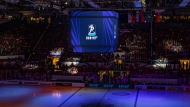Cortina wins thriller over Angers but falls short of Superfinals
Cortina battles back from behind in a nail-biting contest, yet the victory cannot change their fate in the Continental Cup Read more»

New IIHF tournament aims to bring purpose and prestige to European national team breaks
In a bold move reshaping the international calendar, the International Ice Hockey Federation (IIHF) has officially introduced the European Cup of Nations, a fresh competition designed to give more significance to national team games outside of the World Championships.
This initiative is a central component of the IIHF’s ICE26 strategic plan, aiming to inject consistency, purpose, and competitive edge into the traditional international breaks
The inaugural edition is scheduled to run through the customary November, December, and February breaks.
A total of 18 European national teams will compete, organized into groups of three or four across the continent.
The participating nations are:
Germany, Slovakia, Latvia, Norway, Denmark, Austria, Hungary, Poland, France, Slovenia, Great Britain, Italy, Netherlands, Lithuania, Estonia, Spain, Romania and Ukrain
All matches will be streamed live on IIHF TV, making them accessible to hockey fans around the globe and amplifying the exposure of European hockey beyond just the World Championship window.
One of the enduring criticisms of the international hockey schedule has been that national team breaks often produce matches with little meaning—friendlies, exhibition games, or mismatched contests with no stakes. The European Cup of Nations intends to change that:
As IIHF President Luc Tardif emphasized, “For years, our Member National Associations have asked for a framework that brings consistency and purpose to national team breaks. With the European Cup of Nations, we’re finally delivering a product that has the potential to grow the game — competitively and commercially — across the region.
Morten Green, General Manager of the Danish national team, highlighted that the competition is “about creating meaningful competition, not just games … it’s a chance to build rivalries, raise standards, and make international breaks count."
In short, the IIHF views this new tournament as a way to:
Offer regular, structured, competitive games for national teams beyond the World Championships.
Provide more exposure and content for fans and marketing partners.
Support player development via higher-quality international competition.
Strengthen European hockey’s internal ecosystem, creating rivalries, continuity, and relevance outside major tournaments.
Initial responses have been largely supportive among national federations. Many see it as a missing link—a way to fill otherwise passive months in the international calendar with meaningful matchups. Some media outlets note, however, that not all European hockey powers appear in the first edition: for instance, Switzerland is reported to be excluded from the participating lineup.
In a commentary piece, DubNetwork called it “a milestone for European ice hockey,” observing that the new competition “fills the international breaks with exciting and meaningful national team duels.” Another media source noted that the Cup is “intended to enhance the value of international matches outside the World Championships.”
Some hockey fans and observers on discussion forums have offered more skeptical takes. One user on Reddit wrote:
“Excludes all the ‘good’ Euro countries, but I guess this is a cool ‘B’ event for those that aren’t rich in NHL talent. Should be interesting to watch!"
Another commented that it might mirror the European “B-level” competitions, while top-tier European nations continue in their own circuits
Among the challenges ahead:
If successful, the European Cup of Nations could evolve into a marquee mid-tier European hockey competition—something akin to the UEFA Nations League in football, giving mid-ranked nations a stage to shine without being overshadowed by global tournaments. By institutionalizing meaningful matches during international breaks, the IIHF is betting that player motivation, fan interest, and federation support will all increase.
Whether the tournament becomes a staple of the European hockey landscape will depend on execution, competitive balance, and market uptake. But as the IIHF itself asserts, it is not merely launching a tournament—it is building “a sustainable, marketable product that supports both player development and fan engagement between major tournaments.”
 Fatih Faner
(F)
Fatih Faner
(F)
 Buz Adamlar GSK
Buz Adamlar GSK Zeytinburnu Belediyesi SK
Zeytinburnu Belediyesi SK Savely Voronov
(G)
Savely Voronov
(G)
 İstanbul BB SK
İstanbul BB SK Zeytinburnu Belediyesi SK
Zeytinburnu Belediyesi SK Petr Kratochvíl
(F)
Petr Kratochvíl
(F)
 PSG Berani Zlín
PSG Berani Zlín Piráti Chomutov
Piráti Chomutov Pavel Kordule
(F)
Pavel Kordule
(F)
 Piráti Chomutov
Piráti Chomutov PSG Berani Zlín
PSG Berani Zlín Adam Robbins
(F)
Adam Robbins
(F)
 Cincinnati Cyclones
Cincinnati Cyclones Coventry Blaze
Coventry Blaze Gustav Bryvall
(D)
Gustav Bryvall
(D)
 Väsby IK
Väsby IK Roman Petruchik
(D)
Roman Petruchik
(D)
 HK Brest
HK Brest HK Gomel
HK Gomel
 Czech Rep.:
Tipsport extraliga |
1.liga |
2.liga
Czech Rep.:
Tipsport extraliga |
1.liga |
2.liga
 Slovakia:
Tipsport Extraliga |
1.liga
Slovakia:
Tipsport Extraliga |
1.liga
 Sweden:
SHL |
HockeyAllsvenskan
Sweden:
SHL |
HockeyAllsvenskan
Other: EBEL | Belarus | Croatia | Denmark | Estonia | France | Great Britain | Iceland | Italy | Latvia | Lithuania | MOL-liga | Norway | Poland | Romania | Serbia | Slovenia | Spain | NHL | AHL |
Cortina battles back from behind in a nail-biting contest, yet the victory cannot change their fate in the Continental Cup Read more»
Clinical finishing and elite goaltending send Riga through to the final stage Read more»